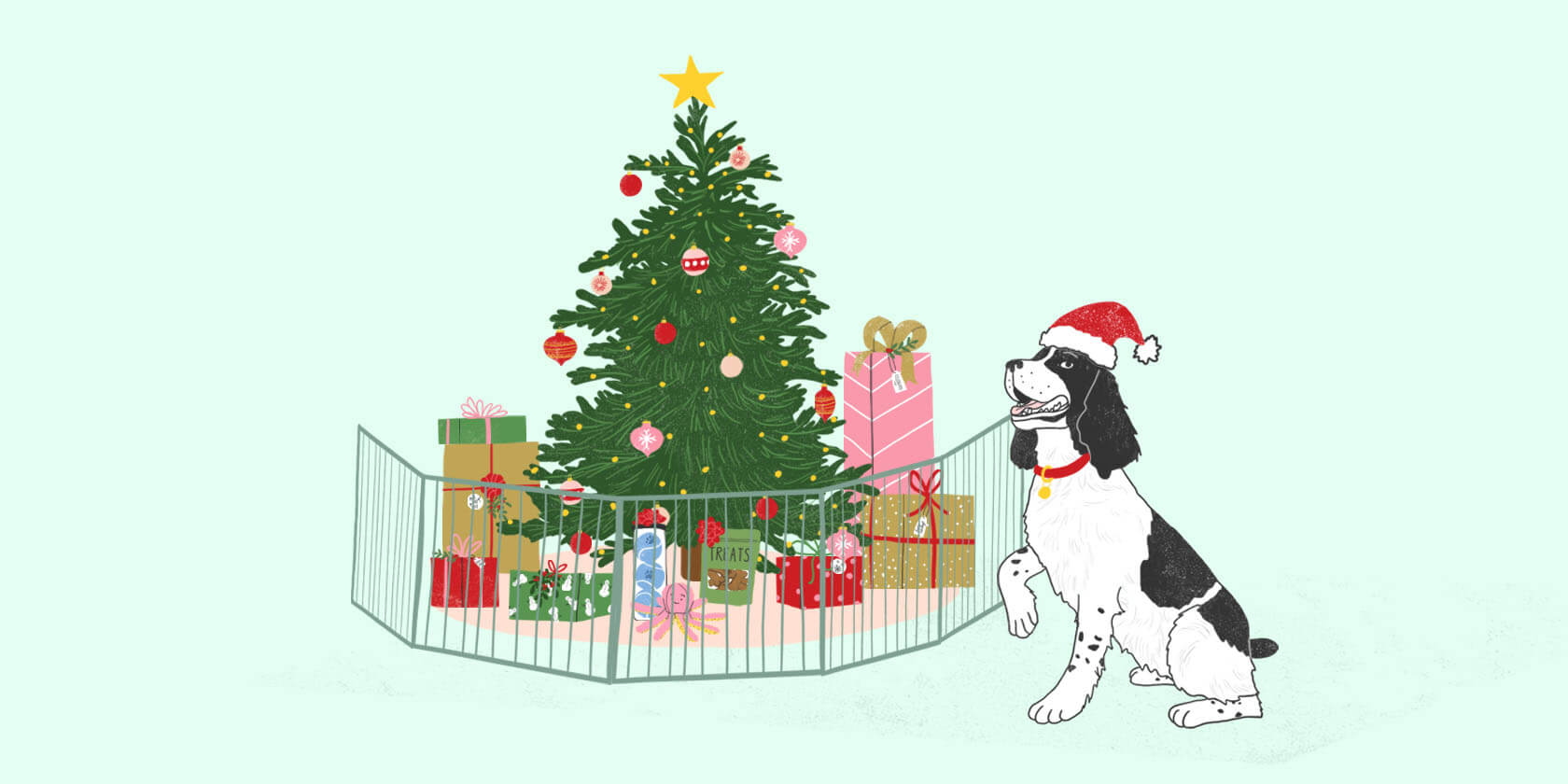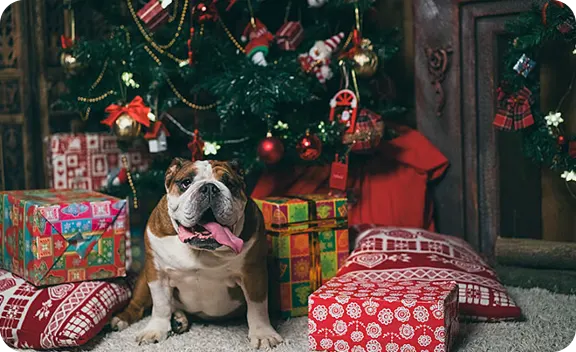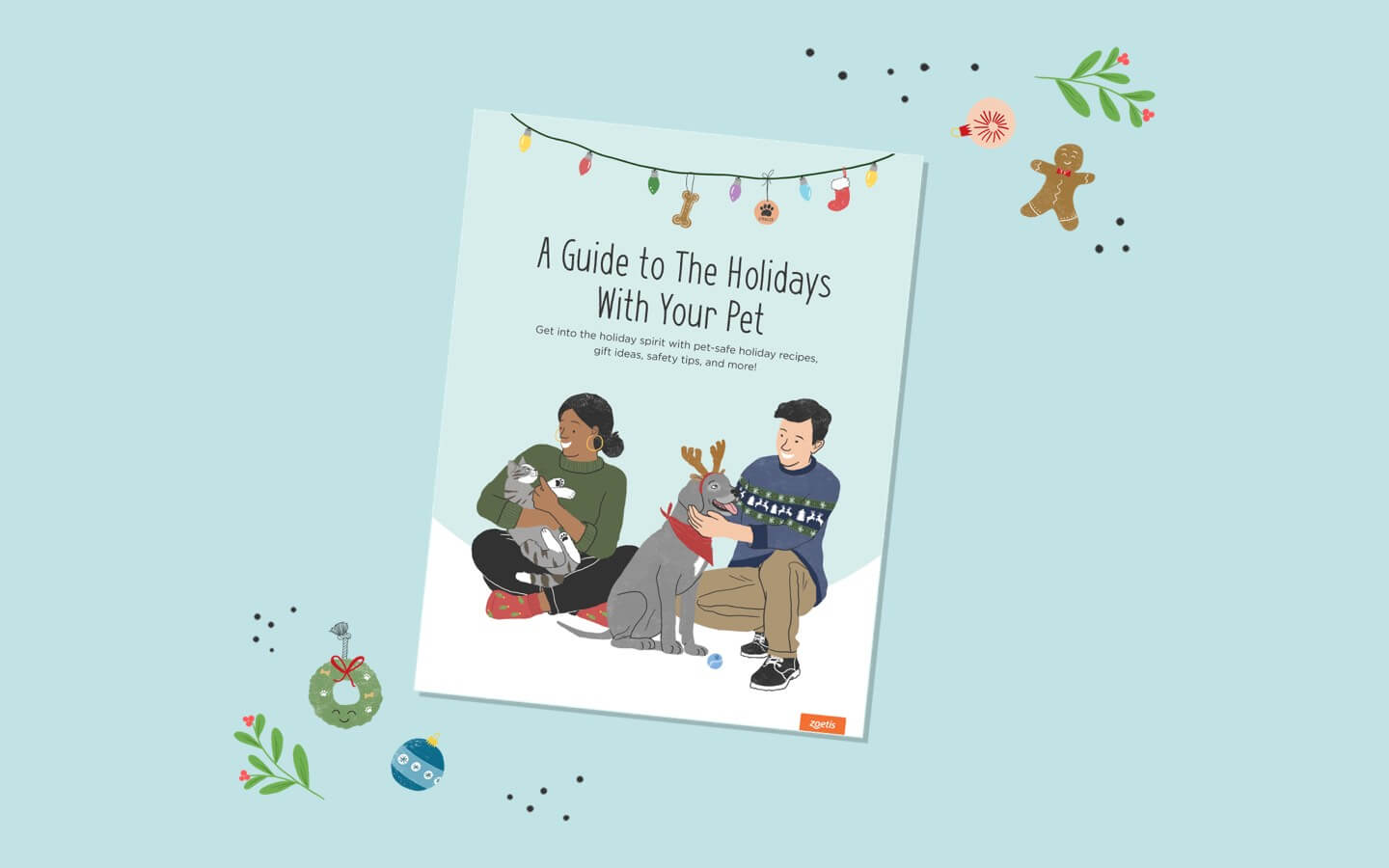The holidays are a great time to get festive, decorate, and welcome family into your home. It’s usually not a time for holiday pet safety to be top of mind. However, taking a few preventive measures before and during the holidays can help to ensure a happy and safe holiday season for your pet.
Decorate Safely
Mistletoe, holly, and even Christmas trees and garland are problematic if nibbled on or eaten by your dog or cat. If you’re planning on decorating with these plants, do your best to keep them out of reach. Use doors or gates to keep those pets away from trees and garland or use a spray that discourages chewing to help pets steer clear.
In terms of a Christmas tree, your pets don’t even need to nibble on one for it to cause problems. Christmas trees (real or artificial) can be dangerous for cats that try to climb them. Cats love to climb, and with the allure of something tall with lights and dangling ornaments, it’s no wonder cats are drawn to Christmas trees. Make your Christmas tree less exciting to your cat by avoiding tinsel, which could also cause serious internal trouble if eaten, and keeping shiny glass ornaments out of reach. Secure your Christmas tree with a sturdy base (maybe even your wall) to minimize the risk of it falling over.

It’s not just cats that are fascinated with Christmas trees. For those dogs and puppies that are enchanted by the ornaments, lights, gifts, and tree water (which may contain dangerous chemical additives or even bacterial growth), an exercise pen or gate will keep them out of trouble and ensure you don’t come home to a disaster or a sick dog.
With all the extra lights plugged in everywhere, your pet is at risk for electric shock and your home is at risk for a house fire if they nibble on a cord. Keep your pet away from cords by blocking their access to them or covering the cords with PVC piping to protect them from your pet’s inquisitive teeth. Rubbing cords with a bitter spray can help as well.
Watch What They Eat (Or Steal)
Feeding your pet high-fat table scraps (like turkey/ham drippings or side dishes with butter) can put your pet at risk for pancreatitis. Pancreatitis is an extremely painful condition that can lead to vomiting, diarrhea, decreased appetite and energy, and even a prolonged and expensive holiday stay in the ER[1]. And even if you don’t share fatty foods with your pet, your guests might.
It’s not just high-fat foods that are dangerous to your pet. Any foods that contain garlic, chives, or onions (like mashed potatoes, stuffing, or Hanukkah latkes) can destroy your pet’s red blood cells and leave them dealing with anemia. Raisins or currants commonly found in fruitcake, holiday kugels, and rugelach can potentially destroy a dog’s kidneys, leading to debilitating acute kidney failure. Xylitol, a popular sugar substitute, is toxic to dogs as well. And don’t forget chocolate! Whether it’s a wrapped box of chocolates under the tree or the dreidel gelt, a moment of indiscretion by your pup could lead to heart or nervous system problems.
You can still safely give treats to your pets during the holidays. Rather than feeding them table scraps of rich food, feed them treats made specifically for dogs/cats or raw veggies like carrots or broccoli, cooked unseasoned and skinless white meat turkey, or plain pumpkin (not the seasoned pie filling).
Manage Your Pet’s Fears
For many dogs and cats, the holidays can cause fear and anxiety with the new faces entering their home. You can help your pets by providing them a safe space to retreat to that is away from the noise and activity. Make it inviting with a bed, their favorite toy, food, and water (and for cats, be sure to include a litter box).
For those dogs that are afraid of the loud booms of fireworks from New Year’s Eve celebrations, follow these noise aversion tips to help your dog. You can also talk to your dog’s veterinarian about medication to help treat their noise aversion.
Travel Safely
Traveling with your pet can be stressful — and traveling with your pet during the holidays can add even more stress to the mix. Allow more time to get somewhere than you think it’ll take and give your pet plenty of potty breaks. Remember to safely secure your pets during travel and contact your veterinarian early for vomiting medication if your dog suffers from vomiting due to motion sickness.
Following these holiday pet safety tips will help you and your pets have a happy holiday season.
ZPC-00429R2
- What is Pancreatitis? AAHA. https://www.aaha.org/your-pet/pet-owner-education/ask-aaha/Pancreatitis-in-Pets/. Accessed December 23, 2024.



